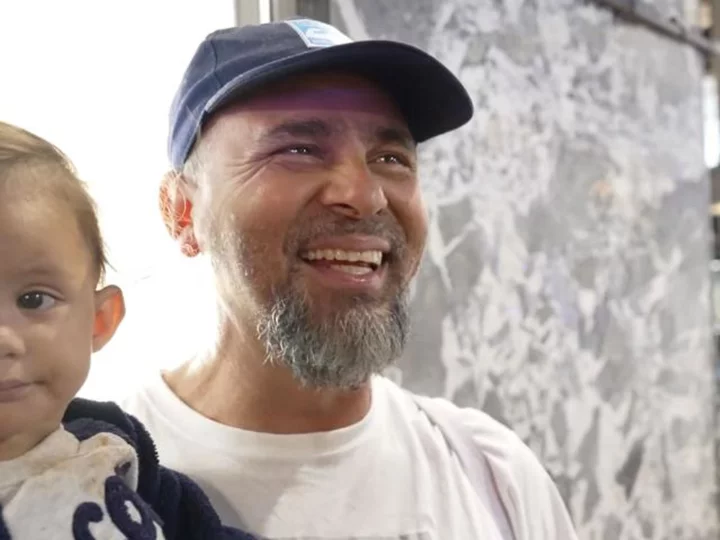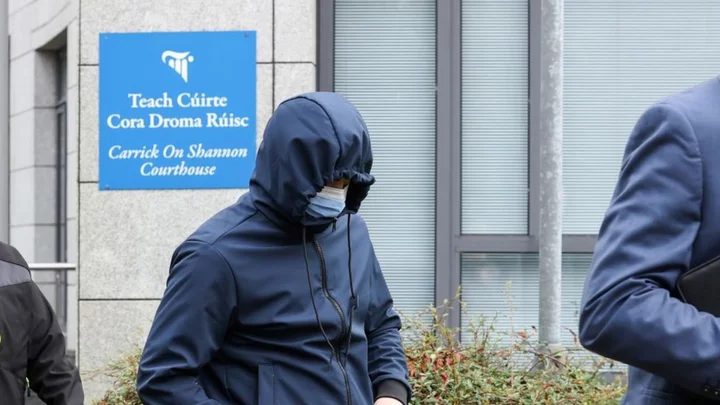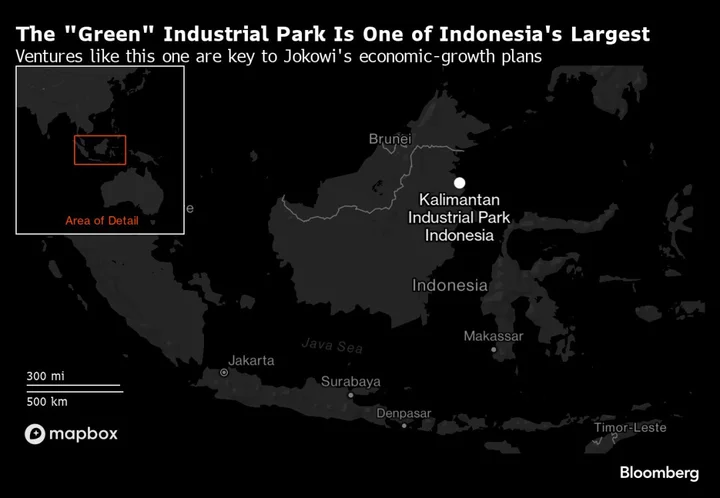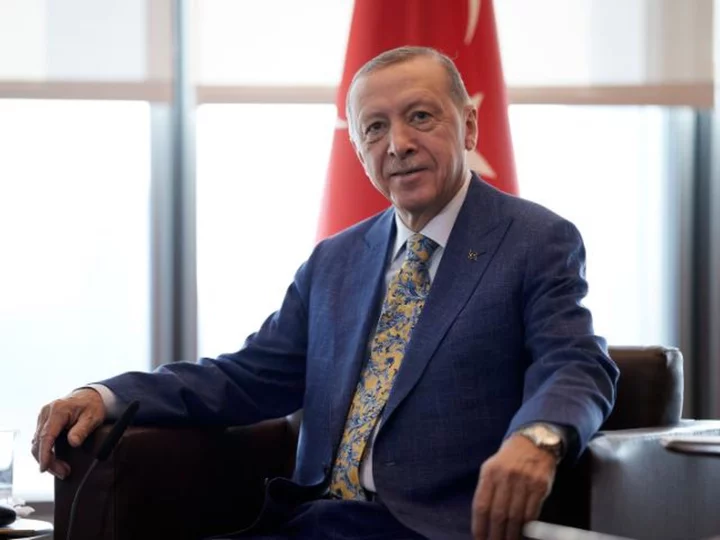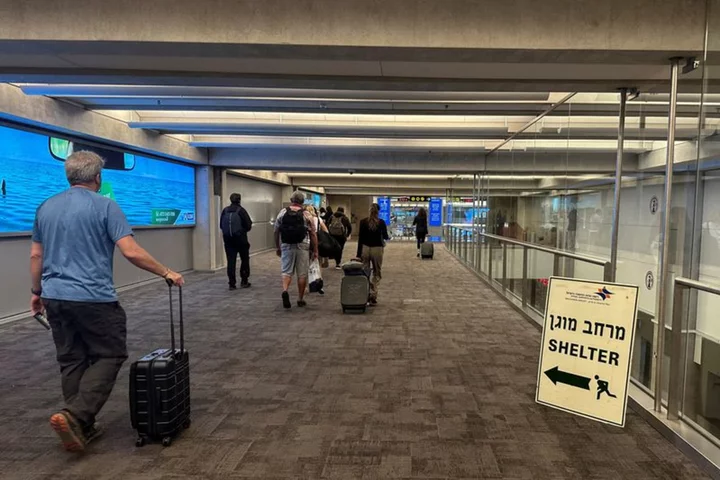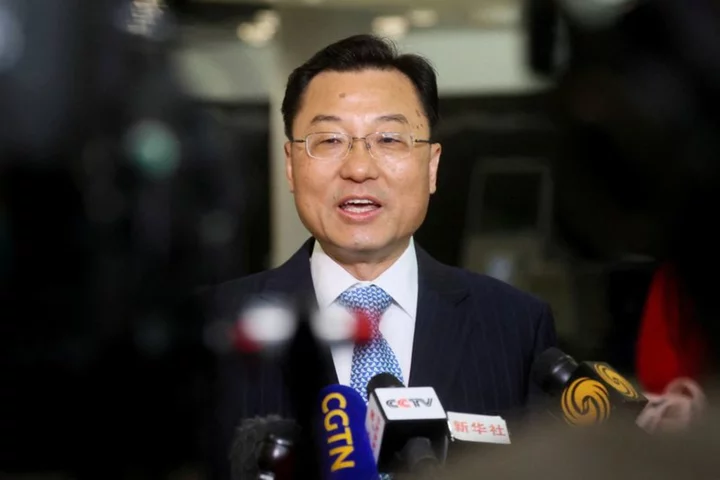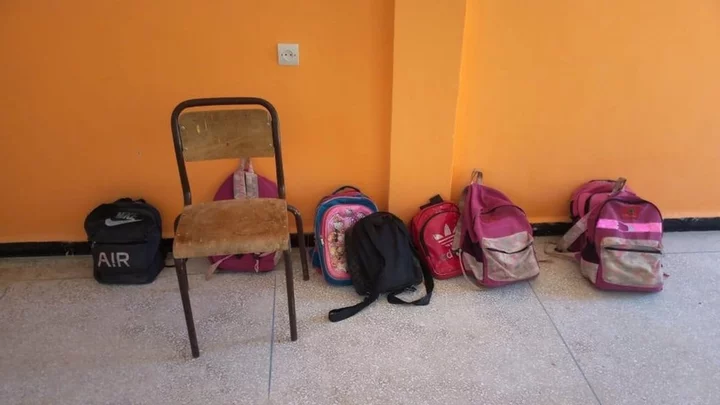Jean Carlos Marin-Espinoza has a smile as bright as the lights of New York City. Standing on a corner in midtown Manhattan, he talks about the generosity shown so far to him and his family -- a hotel room, food and clothes.
He tells CNN he and his wife fled Venezuela to escape the poverty, violence and crime that is rife under the repressive regime of President Nicolas Maduro and says he is happy to feel safer and freer.
But then his grin fades. "You have to smile so you don't cry," he said. "Because if you (cry), then you get desperate."
He is one of thousands of asylum seekers from all over the world to arrive in New York City this summer, straining local resources and becoming a visible sign of the humanitarian influx, many hundreds of miles away at the southern border. Some of those seen chatting on the streets during the day have been bussed up from Texas and some have arrived on their own but, under a local mandate, the city must offer shelter to all.
That's how Marin-Espinoza and his family got a room at the Roosevelt Hotel. And it's through the city's assistance that they have been eating and getting new clothes to replace all the belongings he said they lost crossing the Rio Grande from Mexico into Texas. The king-size bed, TV and air-conditioning they now enjoy are a far cry from the conditions they faced in the month they spent getting to the United States, when they slept when they could and were hungry most of the time. "Here, with the food that they've given me, I've fattened up a bit," the still slight Marin-Espinoza said. "Before, I was very skinny."
Mayor Eric Adams has said the cost of the migrant crisis could "destroy" New York unless there is more state and federal help. Marin-Espinoza demurs when asked his view on the broader political situation, focusing on immediate needs. He has no home, his one-year-old is sick and he wants to get a job to provide for his family.
"It's good but what I want the most is a job," he says, wearing a donated ball cap and a "I'm an NYC Vax Champ" t-shirt that harken back to the city's Covid crisis. "With your own job, you can make your own money."
Inside the new Ellis Island
The Roosevelt Hotel that hosted Marin-Espinoza has a cavernous entrance hall full of fading majesty and glamour that once befitted its prime location between the glittering towers of Rockefeller Center and the Chrysler Building, a short block from Grand Central Station.
Closed to visitors since 2020, it has been taken over by New York City and is now the main intake facility for migrants. On the upper floors every room is full, with the hotel housing about 3,000 people, officials say. And downstairs, between 300 and 500 people on average enter every day seeking help, said Dr. Ted Long of the New York City Health + Hospitals agency, who has called the Roosevelt "the new Ellis Island," after the site in New York Harbor through which 12 million immigrants entered the US.
The arrivals first show that they are allowed to be in the US, while claims for asylum are processed, and then the help begins.
First there's the offer of a restroom, food, water, and supplies for any children. Then there are physical and mental health screenings and vaccinations.
And just as important is the offer of human dignity, said Deputy Mayor for Communications Fabien Levy, especially for those sent to New York by other states.
"Their first interaction in the country was a local government sending them without food, without proper health care, putting them on buses to a location some didn't want to come to. And so, we have to build up that trust again."
It's loud inside, with the sounds of children crying and playing and wondering what's next. There seems to be some hope in the air, but so much exhaustion all around, with families having made it so far, but still so far from a new, safe, home.
Long added: "In New York City, one of our primary concerns is making sure that everybody gets the medical care, which is a human right that they deserve, and don't risk transmitting diseases that are preventable to other people upon arrival. We fix that as soon as people come to the arrival center."
Medical care was a prime concern for Leidi Caeza, who was feeding a bottle to her 8-month-old baby Mia. She told CNN they had left Ecuador because the father of her child kept threatening to hurt them and discriminated against Mia, who needs treatment for a health condition.
"I feel happy because I'm here with my baby, I feel safe here," she said.
"I'm scared of going back home because of the way he threatened us."
While talking to CNN, Caeza, 23, got some good news. A space had opened up and she was able to move into a room for her and Mia, allowing more people into the Roosevelt lobby to start their own process.
The cost of care
Long said offering medical treatment to the asylum seekers was not a burden, but simply standard public health practice to protect everyone from communicable diseases that recognize no borders. But there was a cost.
"We've proudly helped to change the lives of more than 110,000 asylum seekers. But we're doing that by picking up the tab for the rest of the country. We can't keep doing that if we don't get the help," he said.
Levy added more details of what has been spent on asylum seekers: "This fiscal year, we expect to spend almost $5 billion. Just to put that in perspective -- that's almost the budget of the Sanitation Department, the Parks Department and the Fire Department combined."
The city asks every arriving family if they have relatives or friends they want to go to and can help by getting them a bus ticket to another city. About 1 in 4 have those connections and leave New York almost at once, Long said.
But there's one key difference between those coming to the city now and those who came through Ellis Island more than a century ago: many do not have a community waiting to take them in and they need to get permission to work, said Murad Awawdeh, executive director of the New York Immigration Coalition.
That means they need help initially, but he insists they will contribute as generations of immigrants have before.
"The people who have come here will be the city and the state's future," Awawdeh said. "We have a huge workforce need here. We have huge amounts of people who have left our city and our state because of Covid. We need the population. We need to see this as an opportunity, our golden ticket to help us power through into the future and get through the rough times ahead because we will have a rough time."
Global influx
The people who come through the Roosevelt include many who have made the trek through Central America, but they also include people from all over the world.
Long said one case that has stuck with him was a woman from West Africa who had undergone genital mutilation when she was a baby and had just given birth to a daughter.
"She said that she would do anything in her power to protect her daughter from undergoing the same atrocity that she did. So immediately upon giving birth, she made it here to the US and came up to New York City," he said. "Nothing would stand in her way, even with a two-week-old baby."
In the melting pot of the Roosevelt, so many of the families are Muslim that the city now makes sure all the meals offered are halal. Italian food has proved to be the most popular, but roast beef sandwiches were a dud, so were taken off the menu.
For Marin-Espinoza and his family, the chance to perhaps buy and cook their own food is getting a little closer. He was given a new place to stay, and the Biden administration decided to allow Venezuelans who arrived before July 31 to get work permits.
He clutched a paper with the address of his new shelter in Queens, New York, along with his Metro card. A trip on the New York subway beckoned as the next, if not the last, part of his journey.

